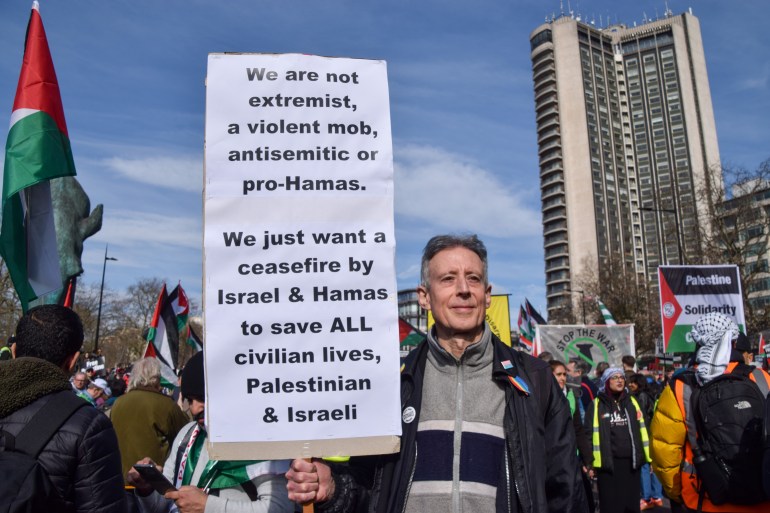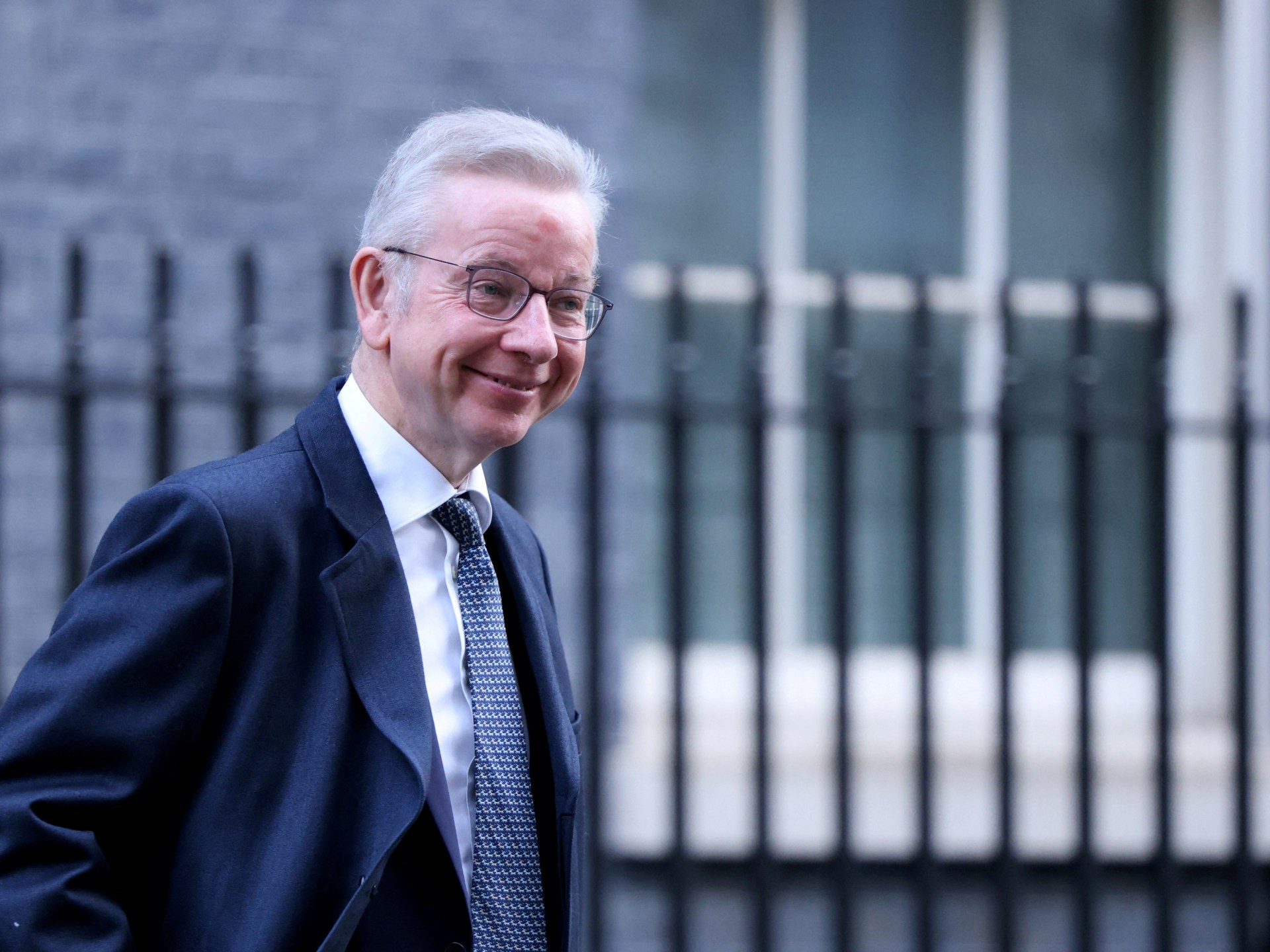United Kingdom Communities Secretary Michael Gove has unveiled the government’s new definition of “extremism” to the House of Commons amid heightened domestic tensions since the onset of Israel’s war on Gaza in October.
The veteran Conservative Party politician said on Thursday that the new definition seeks to tackle the rise of Islamophobia and anti-Semitism in Britain.
Gove, who days ago asserted that “good-hearted people” attending pro-Palestinian demonstrations were “lending credence to extremists”, told MPs that the war in the Middle East was behind a “significant increase in extremism”.
Gove’s statement to parliament comes just four days after three former Conservative home secretaries – Priti Patel, Sajid Javid and Amber Rudd – signed a joint statement with others, including Neil Basu, the former head of counterterrorism policing, warning about the risks of politicising “anti-extremism” measures.
“We urge the Labour party and the Conservative party to work together to build a shared understanding of extremism and a strategy to prevent it that can stand the test of time, no matter which party wins an election,” their Sunday statement read.
But Gove, who described Israel as “a light to the world” at a Conservative Friends of Israel event in 2017, remains under pressure to justify his new initiative as speculation mounts over whether Prime Minister Rishi Sunak will call a general election this spring or bide his time until later in the year.
What is the new definition of ‘extremism’?
According to the government, this new definition has been made more “precise”, so individuals or groups that meet the new definition can be identified and essentially blacklisted. Its focus is ideological, in contrast to the last version drafted in 2011, which placed greater emphasis on acts of violence.
According to the new definition: “Extremism is the promotion or advancement of an ideology based on violence, hatred or intolerance, that aims to negate or destroy the fundamental rights and freedoms of others” or “undermine, overturn or replace the UK’s system of liberal parliamentary democracy and democratic rights”.
It also includes anything that would “intentionally create a permissive environment for others to achieve” either of the above aims.
The strategy is nonstatutory, which means groups would not be prosecuted merely as a result of meeting the parameters of this new definition. Instead, those labelled as “extremist” by the government would become ineligible for any government funding. Groups that are blacklisted under the new definition would also be barred from meeting with ministers.
Can groups or individuals deemed ‘extremist’ be named?
Yes. A full list of those identified as “extremist” is expected to be published in the coming weeks. Gove told The Times on Thursday that people and organisations on the list would be identified by “academics, officials and ministers” who would “carefully consider a person or group’s behaviour over a longer period before labelling them extremist”.
However, in parliament on Thursday, Gove took the step of naming the neo-Nazi British National Socialist Movement, the far-right Patriotic Alternative, the Muslim Association of Britain, the Cage advocacy group, and Muslim Engagement and Development as UK-based organisations that will be held “to account to assess if they meet our definition of extremism and [we] will take action as appropriate”.
Of the two far-right groups, Gove said they “promote Neo-Nazi ideology” and are “precisely the type of groups about which we should be concerned”.
The British National Socialist Movement was founded in 1985 – born from the older “British Movement” – and is known for its football hooligans and “white power” skinhead movements. Patriotic Alternative, founded in 2019, is the UK’s largest “white nationalist” movement with branches all around the country.
What has been the reaction to the new definition?
The archbishops of Canterbury and York, Justin Welby and Stephen Cottrell, said in a joint statement on Tuesday that the new definition “risks disproportionately targeting Muslim communities, who are already experiencing rising levels of hate and abuse”.
A Muslim Conservative peer, Baroness Sayeeda Warsi, who has long urged her party to tackle Islamophobia among its members, said on X on Wednesday: “Michael Gove will not divide us in his ideological pursuit of a policy that has been rejected and criticised by victims of terrorism, ex Home Secretary’s and even the Archbishop of Canterbury.”
John Mann, an independent adviser to the government on anti-Semitism, told the BBC: “I think that the government needs to listen to people who are advising that the politics of division will not work.” He said it should prioritise “bringing communities together”.
Cage, which campaigns on behalf of communities it says have been adversely affected by the West’s “war on terror”, posted on X: “We reject the counter-extremism and counter-terrorism powers that allow for arbitrary and authoritarian interventions against dissenting citizens. We will explore all avenues, including legal, to resist the Government’s deep dive into authoritarianism.”
Meanwhile, the Palestinian Solidarity Campaign said in a statement on Thursday: “As the coalition of groups who have been organising the national marches calling for a ceasefire in Gaza, we condemn Michael Gove’s statement today. His redefinition of extremism, framed as a defence of democracy, is in reality an assault on core democratic freedoms, seeking to silence dissenting voices.”
The two far-right organisations named by Gove under parliamentary privilege did not immediately respond.

Is Gove’s initiative an attempt to silence pro-Palestinian campaigners?
Some said it is. Chris Doyle, director of the London-based Council for Arab-British Understanding, told Al Jazeera that Gove’s initiative is based on a Conservative government tactic that aims to “play culture wars” and “to link the [pro-Palestinian] protests to extremism and anti-Semitism”.
He added: “It [also aims] to drag Labour into this and challenge [its leader] Keir Starmer as to whether Labour agrees with these plans. If Labour does, it will further divide the party. If it does not, Gove will accuse Labour of being soft on extremism. At the same time, it is a huge distraction from the real issue, which is the Israeli slaughter in Gaza.”
Indeed, some observers have suggested that Gove’s move is simply a culmination of efforts by the ruling Conservatives to equate pro-Palestinian activism with “extremism”.
For example, just after the Israeli state launched its war on Gaza following the Hamas attacks on southern Israel on October 7, then-UK Home Secretary Suella Braverman took to labelling protests against Israel’s war on Gaza, which has so far killed more than 31,000 Palestinians, as “hate marches”.
And last month, Conservative MP Paul Scully faced criticism after he claimed there were “no-go areas” for non-Muslims in parts of London and Birmingham. He later apologised for these comments.
One day after the staunchly pro-Palestinian campaigner George Galloway secured the English parliamentary seat of Rochdale in a by-election on February 29, Sunak made an impromptu speech outside his Downing Street residence, where he alleged that pro-Palestinian marches were a hotbed of “intimidation, threats and planned acts of violence”.
What is Gove’s history of tackling ‘extremism’?
The Scottish-born MP began espousing his views on “extremism” 18 years ago when he published his book exploring the roots of “Islamism” in Britain, Celsius 7/7, in the wake of the coordinated suicide bomb attacks on the London transport system on July 7, 2005.
In a review of Gove’s book for The Sunday Times in 2006, acclaimed Scottish historian William Dalrymple alleged that Celsius 7/7 was “riddled with … factual errors and misconceptions” and said Gove’s work was fatally undermined by his having “never lived in the Middle East … [and having] barely set foot in a Muslim country”.
And in 2014, Gove – then the education secretary – was accused of leading an “Islamophobic witch-hunt” against schools in Birmingham, England.
Eight years later, a New York Times podcast on the issue alleged that Gove had ignored warnings that assertions of an “Islamic extremist takeover” of Birmingham schools, known as the Trojan Horse affair, were “bogus”.
Check out our Latest News and Follow us at Facebook
Original Source

